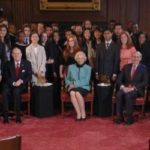If the constitutional guarantee of a fair trial is to be realized, the process used for selecting jurors must also be fair. Before Edmonson v. Leesville Concrete Co., the constitutional principle of equal protection under the law had been applied to federal jury selection practices in criminal trials but not in civil trials. In this lesson, students learn about jury selection and how the role and responsibilities of government in civil and criminal jury trials are viewed by the Supreme Court.
A Conversation on the Right to Trial by an Impartial Jury
Jury Selection: Edmonson v. Leesville Concrete Co.
The Constitutional Convention: Fine Tuning the Balance of Powers
History is the chronicle of choices made by actors/agents/protagonists in specific contexts. This simulation places students in the midst of the Constitutional Convention, after the Committee of Detail has submitted its draft for a new Constitution on August 6. With that draft’s concrete proposals on the floor, students will ponder questions such as: Is this the Constitution we want? Are the people adequately represented? Are the branches well structured? By engaging with these questions mid-stream, before the Convention reached its final conclusions, students will experience the Constitutional Convention as process, a supreme example of collective decision-making.


